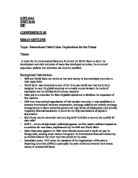"We now live in a world of multinational and transnational corporations" (Abercrombie and Warde). What implications does this have for us?
“We now live in a world of multinational and transnational corporations” (Abercrombie and Warde). What implications does this have for us?
This is a question about the effects of globalisation on the world. Globalisation is quite a recent phenomenon, with the term only really being coined in the 1980’s, however the concept has been around for decades, even centuries with the earliest expansion of European capitalism dating back to the early 16th century with the beginnings of colonialism. However, the rapid growth of globalisation began in the late 19th century with the build up to the 1st World War and the great depression forcing countries to trade. Following WW2 companies began to look globally for expansion with new markets now available. The 2nd industrial divide and development of new technologies, especially in the field of communication led to development of international business and when the Berlin Wall fell and the USSR broke up, capitalism was dominant and new areas of possibility began appearing. With the communication revolution that is occurring, especially the Internet and large corporations such as McDonalds spreading throughout the world globalisation is a reality that affects every single one of us in one way or another. Globalisation is such a big issue (with 2882 academic papers and 589 books written in 1998 alone), it is hard to cover all the affects in one essay, so I will try and cover the most important points within the categories of economic, social, cultural and political.
Many see globalisation as purely an economic fact, and to some extent this is the most important aspect of globalisation. The economies of the world have become global with no more state economies as money flows freely around the world with large organisations to ‘control’ this, such as the World Bank and International Monetary Fund. This increase in international trade has led to 16 times the amount of goods being traded around the world since 1950. This has made us richer with the creation of many more jobs, and now more opportunities to work abroad as these jobs flow between nations as well as money. According to Professor Garellis, this opening of world markets and harmonisation of international business rules through such agreements as the General Agreement on Tariffs and Trade (GATT) puts enormous pressure on business to relocate as a massive labour force that was once unreachable is now reachable, usually at a much lower cost. This can be argued as exploitation as labourers are paid much less than they would be in the West. Is this fair? Would they have a job at all without globalisation? Jobs are now created and lost at will with many corporations simply moving to another location in order to maximise profits, many example of this can be seen in Britain over the last decade with many British industries (or foreign industries in Britain) moving elsewhere to maximise their profits and to stay in the competition, trying to compete with companies that have already moved. This has led to a division of labour in the world, where many of the monotonous, unskilled jobs are now done in the east and in developing countries and the more ‘intellectual’ and skilled jobs are done in the West. For example, many computer components are built in Asia, but are assembled and sold in the USA and Britain.







